#nguzo saba
Text
#StarWars #Kwanzaa
#StarWars #Kwanzaa - the 7 lightsaber forms align with the 7 principles of Kwanzaa or the Nguzo Saba. There is no emotion there is only The Force.
The lightsaber forms of Star Wars align with the 7 principles or Nguzo Saba of the first fruits harvest of Kwanzaa. How cool is that? To become a Jedi and use a lightsaber, one could follow the 7 principles of:
Umoja – Day 1 – means Unity of family, legacy and tradition
Kujichagulia – Day 2 – means Self-Determination – manifesting one’s own destiny
Ujima – Day 3 – means Collective Work and…

View On WordPress
#7 principles#african-american heritage#ataru#concepts#family#first fruits#habari gani#imani#juyo/vaapad#kujichagulia#kuumba#kwanzaa#legacy#lightsaber forms#makashi#nguzo saba#nia#niman#shien/Djem So#shii-cho#soresu#Star Wars#SWAG 77#tradition#ujamaa#ujima#umoja
29 notes
·
View notes
Text
Let’s Talk Kwanzaa: Unwrapping the Good Vibes
Alright, folks, buckle up for a ride into the coolest holiday you might not know enough about – Kwanzaa! It’s like the hidden gem of celebrations, packed with tradition, unity, and some serious good vibes. So, let’s spill the beans on what makes Kwanzaa so awesome.
Kwanzaa
Origins and Why It’s a Big Deal:
Kwanzaa is like the ’60s baby of Dr. Maulana Karenga. Born in ’66, it’s got its roots in…
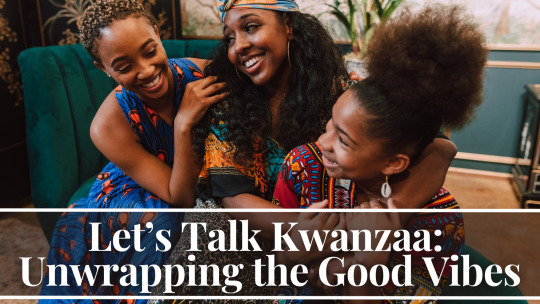
View On WordPress
#African Heritage#Celebrations#creativity#Cultural Celebration#culture#Holidays#Kwanzaa#Nguzo Saba#Purpose#Seven Principles#Unity
5 notes
·
View notes
Text

Here are the 7 days/principles of Kwanzaa and what they represent. I am a white person so I don’t really celebrate it, but I love that there is a holiday to get people through the hard week between Christmas and New Year’s that also celebrates black culture and hasn’t become as exhausting as Christmas with cooking, cleaning, planning, shopping, decorating, etc.
I first learned about kwanzaa from watching the proud family as a kid, but it’s nice to learn more about it.
Sorry I forgot to share this yesterday when it actually started. I intend to share it throughout this week.
Yesterday was “unity” and today is “Self determination”!
5 notes
·
View notes
Photo



(via "Kwanzaa Vibes" Classic T-Shirt for Sale by genieroze)
Introducing our spirited tee, "Kwanzaa Vibes: Celebrate the Seven Tribute Kwanzaa." The vibrant design features the word "Kwanzaa" adorned with flames over each letter, symbolizing the illuminating spirit of the holiday. A beautifully lit Kinara, embodying the Seven Principles (Nguzo Saba), takes center stage. This shirt isn't just an article of clothing; it's a wearable celebration of unity, creativity, and faith. Wear it proudly, and let the Kwanzaa vibes ignite the festive joy in every heart
0 notes
Text
Kwanzaa:
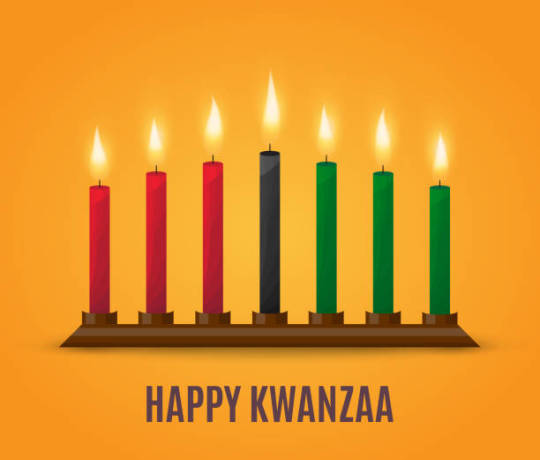
Kwanzaa, an annual holiday celebrated primarily in the United States from December 26 to January 1, emphasizes the importance of pan-African family and social values. It was devised in 1966 by Maulana Karenga, Inspired by Africa’s harvest celebrations, he decided to develop a nonreligious holiday that would stress the importance of family and community while giving African Americans an opportunity to explore their African identities. Kwanzaa arose from the black nationalist movement of the 1960s and was created to help African Americans reconnect with their African cultural and historical heritage. The holiday honors African American people, their struggles in the United States, their heritage, and their culture. Kwanzaa's practices and symbolism are deeply rooted in African traditions and emphasize community, family, and cultural pride. It's a time for reflection, celebration, and the nurturing of cultural identity within the African American community.
Kwanzaa is a blend of various African cultures, reflecting the experience of many African Americans who cannot trace their exact origins; thus, it is not specific to any one African culture or region. The inclusiveness of Kwanzaa allows for a broader celebration of African heritage and identity.
Karenga created Kwanzaa during the aftermath of the Watts riots as a non-Christian, specifically African-American, holiday. His goal was to give black people an alternative to Christmas and an opportunity to celebrate themselves and their history, rather than imitating the practices of the dominant society. The name Kwanzaa derives from the Swahili phrase "matunda ya kwanza," meaning "first fruits," and is based on African harvest festival traditions from various parts of West and Southeast Africa. The holiday was first celebrated in 1966.
Each day of Kwanzaa is dedicated to one of the seven principles (Nguzo Saba), which are central values of African culture that contribute to building and reinforcing community among African Americans. These principles include Umoja (Unity), Kujichagulia (Self-Determination), Ujima (Collective Work and Responsibility), Ujamaa (Cooperative Economics), Nia (Purpose), Kuumba (Creativity), and Imani (Faith). Each family celebrates Kwanzaa in its own way, but Celebrations often include songs, dances, African drums, storytelling, poetry readings, and a large traditional meal. The holiday concludes with a communal feast called Karamu, usually held on the sixth day.
Kwanzaa is more than just a celebration; it's a spiritual journey to heal, explore, and learn from African heritage. The holiday emphasizes the importance of community and the role of children, who are considered seed bearers of cultural values and practices for the next generation. Kwanzaa is not just a holiday; it's a period of introspection and celebration of African-American identity and culture, allowing for a deeper understanding and appreciation of ancestral roots. This celebration is a testament to the resilience and enduring spirit of the African-American community.
"Kwanzaa," Encyclopaedia Britannica, last modified December 23, 2023, https://www.britannica.com/topic/Kwanzaa.
"Kwanzaa - Meaning, Candles & Principles," HISTORY, accessed December 25, 2023, https://www.history.com/topics/holidays/kwanzaa-history.
"Kwanzaa," Wikipedia, last modified December 25, 2023, https://en.wikipedia.org/wiki/Kwanzaa.
"Kwanzaa," National Museum of African American History and Culture, accessed December 25, 2023, https://nmaahc.si.edu/explore/stories/kwanzaa.
"The First Kwanzaa," HISTORY.com, accessed December 25, 2023, https://www.history.com/this-day-in-history/the-first-kwanzaa.
My Daily Kwanzaa, blog, accessed December 25, 2023, https://mydailykwanzaa.wordpress.com.
Maulana Karenga, Kwanzaa: A Celebration of Family, Community and Culture (Los Angeles, CA: University of Sankore Press, 1998), ISBN 0-943412-21-8.
"Kente Cloth," African Journey, Project Exploration, accessed December 25, 2023, https://projectexploration.org.
Expert Village, "Kwanzaa Traditions & Customs: Kwanzaa Symbols," YouTube video, accessed December 25, 2023, [Link to the specific YouTube video]. (Note: The exact URL for the YouTube video is needed for a complete citation).
"Official Kwanzaa Website," accessed December 25, 2023, https://www.officialkwanzaawebsite.org/index.html.
Michelle, Lavanda. "Let's Talk Kwanzaa: Unwrapping the Good Vibes." Lavanda Michelle, December 13, 2023. https://lavandamichelle.com/2023/12/13/lets-talk-kwanzaa-unwrapping-the-good-vibes/.
298 notes
·
View notes
Text
Explore the Symbolic Significance of Kwanzaa Candle Holders
New Post has been published on https://votivecandleholder.com/candle-decoration/explore-the-symbolic-significance-of-kwanzaa-candle-holders
Explore the Symbolic Significance of Kwanzaa Candle Holders
Kwanzaa, a vibrant cultural celebration rooted in African traditions, unites communities to honor heritage and shared values. Explore enchanting Kwanzaa practices and the artistry of Kwanzaa candle holders, adding elegance to the candle-lighting ceremony. From lively festivities to handmade crafts, embrace African culture’s richness during the holiday season. Join us on a joyful journey to discover the impact of Kwanzaa candleholders, one exquisite piece at a time.
Table of Contents
1 The Meaning and Importance of Kwanzaa
2 Different Types of Kwanzaa Candle Holders
3 Rituals and Practices
4 Cultural Significance and Preservation
5 DIY Kwanzaa Candle Holder Ideas
6 Kwanzaa Decorations
The Meaning and Importance of Kwanzaa
Kwanzaa embodies the seven principles symbolized by candles on the Kinara, guiding this dynamic customary practice from December 26th to January 1st.
The Kwanzaa candle holders possess symbolic relevance as they represent the Nguzo Saba principles. Umoja (Unity) calls for togetherness and honoring shared history. Kujichagulia (Self-determination) accepts individuality and shapes destiny. Ujima (Collective work and responsibility) emphasizes cumulative support and improvement. Ujamaa (Cooperative economics) promotes economic empowerment and stability. Nia (Purpose) drives mutual goals and positive results. Kuumba (Creativity) celebrates artistic expression and traditional contributions. Imani (Faith) instills belief in a brighter future. Each candle indicates profound core values, enriching the essence of Kwanzaa.
Gathered around their glow, we adopt these doctrines, igniting positivity and ethical pride.
Different Types of Kwanzaa Candle Holders
Kwanzaa holders are vital, elegant pieces that enhance the holiday’s customs. As the centerpiece of the Kinara, they hold the seven candles illustrating Kwanzaa’s core values. Made from wood, they symbolize African roots and carry deep symbolism, representing legacy.
Conventional candle holders use wood, beads, ceramics, and metals, showcasing cultural abundance. Wooden holders have intricate designs, evoking comfort and rustic charm, while beaded ones offer radiant colors. Ceramic holders depict refinement, metalwork holders bring strength, and clay holders showcase earthy tones and organic shapes, embracing ancient pottery traditions. Their textures and unique forms add an authentic touch to the Kwanzaa candle-lighting ceremony.
Explore contemporary interpretations that fuse modern aesthetics and cultural presentation, offering unconventional designs, from sleek minimalism to bold abstract forms. Whether vintage, artisanal, or contemporary, each holder radiates its charm, symbolizing harmony, ancestry, and treasured values.
Appreciate their beauty and representation, adding warmth and communal pride to your Kwanzaa gatherings. Handcrafted with care, they embody the holiday’s spirit and ideals, reflecting meaningful beliefs. Allow your imagination to lead the way in finding the perfect Kwanzaa candle holders that manifest your distinctive taste, elevating the spirit of your Kwanzaa festivities.
Rituals and Practices
During Kwanzaa, candles are lit in a specific order, enriched by the presence of Kwanzaa candleholders. The ceremony begins with the Mishumaa Saba, symbolizing Umoja (Unity). Subsequent days follow a prescribed order: black candles from left to right, representing Kujichagulia, Ujima, and Imani, and red candles from right to left, symbolizing the same principles. This dance of illumination and reflection adds depth to the festivity.
Lit candles inspire reflective discussions, using candle holders as focal points. These conversations deepen understanding, celebrate achievements, and set intentions. Candle lighting embodies hope, resilience, and a mutual quest toward a brighter future. It fosters solidarity, connects to lineage, and offers transformative experiences. Kwanzaa candleholders witness these rituals, holding the guiding light of unity, self-determination, collective work, and faith.
Cultural Significance and Preservation
Kwanzaa candle holders have profound cultural significance, preserving culture and nurturing community. They express unity, self-determination, collective work, and faith, connecting individuals to their African roots. These holders ensure the longevity of Kwanzaa customs, carrying the memories and experiences of ancestors.
These candleholders deeply influence African diaspora communities, fostering connections and conventional understanding. They spark conversations and reflections, uniting people in observance of their shared heritage and diverse backgrounds. These holders symbolize the unified journey and the importance of embracing diversity within traditions. Recognize the cultural significance of the Kwanzaa candle holders and the importance of it being passed down to ensure the preservation of the prosperity of their culture.
DIY Kwanzaa Candle Holder Ideas
Personalize your Kwanzaa gatherings with DIY Kwanzaa candle holders! Get crafty and express your creativity and personal symbolism. Use alternative materials like glass jars, tin cans, or wooden blocks. Experiment with shapes, patterns, and African-inspired motifs.
Follow these step-by-step instructions: clean and prepare the base material, then paint or wrap jars for an exuberant look, carve or paint symbols on blocks, or mold clay into exceptional shapes. Let them dry, then securely place the candles for safe lighting.
Kwanzaa Decorations
Infuse personal reflection by incorporating elements that represent your family, roots, and aspirations. Involve the whole family, encourage children’s creativity, and share stories and morals. These unique creations enhance your cheerful ambiance and become revered keepsakes.
Finally
Ultimately, it can be said that Kwanzaa candleholders hold a symbolic meaning that goes beyond their physical presence. They signify the values and precepts of Kwanzaa, which allows them to express creativity and personal symbolism. Creating DIY Kwanzaa candleholders adds an individual touch to the celebrations and honors the cultural lineage and traditions. Let’s embrace and appreciate the luxuriance of Kwanzaa, using these candle holders as reminders of unity, self-determination, collective work, and faith. May the festive ambiance shine brightly with the spirit of Kwanzaa!
3 notes
·
View notes
Text
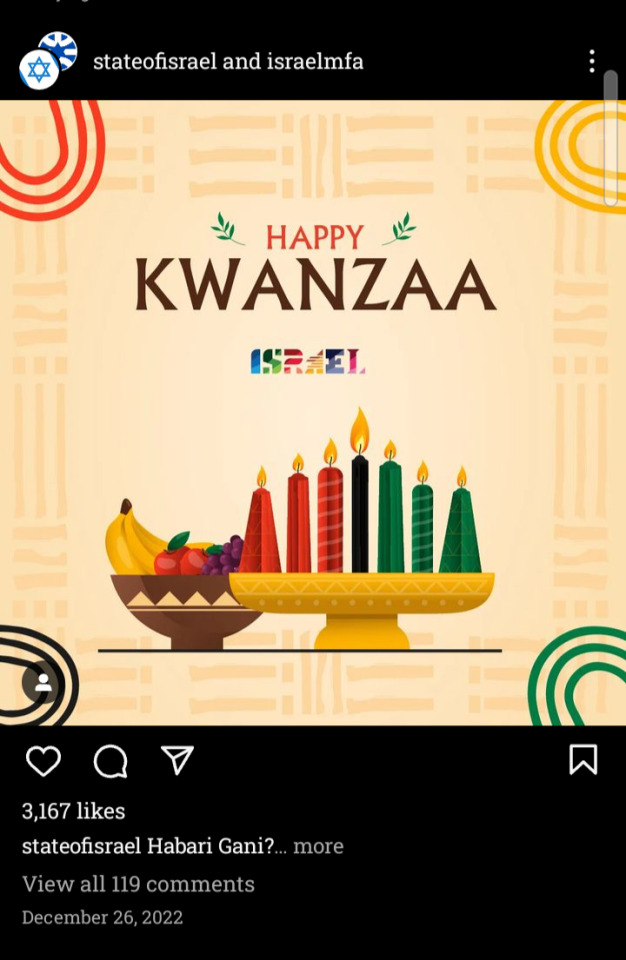
I was almost going to crop out the original page til I saw one was the state's official IG page. So this is propaganda-propaganda. A year old, sure, but the point still stands...
It goes without saying that, while Zionism has nothing really at odds with the Nguzo Saba, any person seriously celebrating Kwanzaa who also supports the state of Israel needs to spend a bit more time looking behind the holiday itself and studying the political and cultural discourses under which it was birthed.
Perhaps they'll learn that, when Israel was first formed, many Black people were in favor of it. We saw kinship with another ethnic minority targeted repeatedly by western white supremacists finding refuge in the homeland of their ancestors.
But not long after, more Black activists learned of the horrors of the Nakba, and the current unbreakable solidarity between Black Liberation and Palestinian Liberation was born.
Whereas Black Nationalist philosophies are explicitly anti-Western hegemony, Zionism is in favor of it, and Israel openly courts support from Western governments by promising to extend Western hegemonic ideologies and structures throughout the Middle East.
Whereas Pan-Africanism acknowledges the sovereignty of all African peoples to rule themselves, Zionism refuses to acknowledge the sovereignty of Palestinians to that same self-rule.
Whereas those of us in Diaspora who believe in an eventual physical return to the African Continent seek peaceful coexistence with other Africans, Zionism does not seek such coexistence with surrounding Arab nations and peoples.
Still, it is Zionism, we in the West must respect as a valid political philosophy. Israel, as an ethnostate, has an inherit right to existence which mustn't be challenged. Biden can go onstage and declare himself a Zionist.
Imagine the backlash had Barack Obama declared himself a Black Nationalist.
Those of us who celebrate Kwanzaa embrace our Jewish friends. We also embrace our Palestinian friends as well. Of course, exceptions will exist, but to those who will not acknowledge Palestine's right to their own version of Kujichagulia, I would encourage you to question why the Jewish right to seek safety in their ancestor's homeland must override the Palestinian right to the very same thing.
There is no central authority for Kwanzaa, not even Karenga has the power to speak for all of us. I do not profess to do that. I can only speak for this blog and say I reject the Israeli state's futile effort to court support of the African Diaspora. And I can only say anyone who does celebrate Kwanzaa and would ally themselves with the Israeli state is doing a disservice to the history of the communities which birthed the holiday.
2 notes
·
View notes
Text
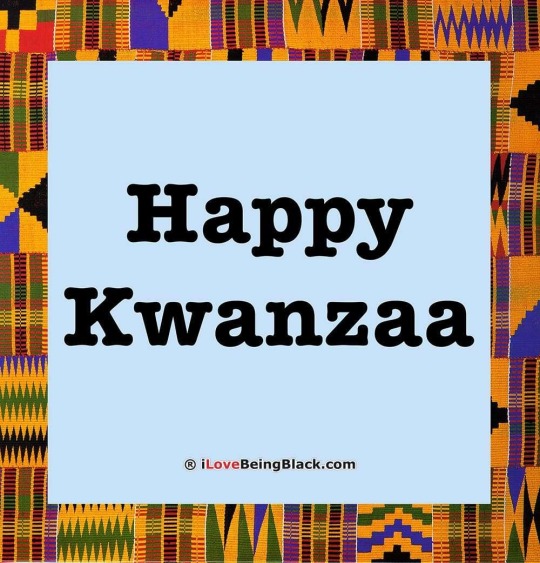
Happy Kwanzaa!
#Kwanzaa is an African American and Pan-African holiday which celebrates family, community and culture. Celebrated from December 26th through January 1st, the origins are in the first harvest celebrations of Africa from which it takes its name. The name Kwanzaa is derived from the phrase "matunda ya kwanza" which means "first fruits" in Swahili, a Pan-African language which is the most widely spoken African language.
Each day is started with this greeting: Habari Gani - What is the news? The reply is the ‘Nguzo Saba’ (principle) for that day. They are listed in order here:
Umoja - Unity
Kujichagulia - Self Determination
Ujima - Collective Work & Responsibility
Ujamaa - Cooperative Economics
Nia - Purpose
Kuumba - Creativity
Imani - Faith
The first-fruits celebrations are recorded in African history as far back as ancient Egypt and Nubia and appear in ancient and modern times in other classical African civilizations such as Ashantiland and Yorubaland. These celebrations are also found in ancient and modern times among societies as large as empires like the Zulu kingdoms (Swaziland) or smaller societies and groups like the Matabele, Thonga and Lovedu, all of southeastern Africa. Kwanzaa builds on the five fundamental activities of Continental African "first fruit" celebrations: ingathering; reverence; commemoration; recommitment; and celebration. Kwanzaa, then, is:
• a time of ingathering of the people to reaffirm the bonds between them;
• a time of special reverence for the creator and creation in thanks and respect for the blessings, bountifulness and beauty of creation;
• a time for commemoration of the past in pursuit of its lessons and in honor of its models of human excellence, our ancestors;
• a time of recommitment to our highest cultural ideals in our ongoing effort to always bring forth the best of African cultural thought and practice; and
• a time for celebration of the Good, the good of life and of existence itself, the good of family, community and culture, the good of the awesome and the ordinary, in a word the good of the divine, natural and social.
Kwanzaa was established in 1966 in the midst of the Black Freedom Movement and thus reflects its concern for cultural groundedness in thought and practice, and the unity and self-determination associated with this. It was conceived and established to serve several functions.
Finally, Kwanzaa is a cultural holiday, not a religious one, thus available to and practiced by Africans of all religious faiths who come together based on the rich, ancient and varied common ground of their Africanness.
Courtesy of:
http://www.officialkwanzaawebsite.org/origins1.shtml
1 note
·
View note
Text

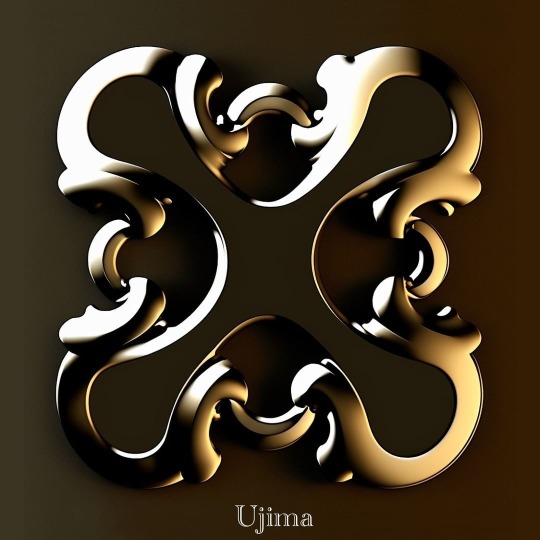

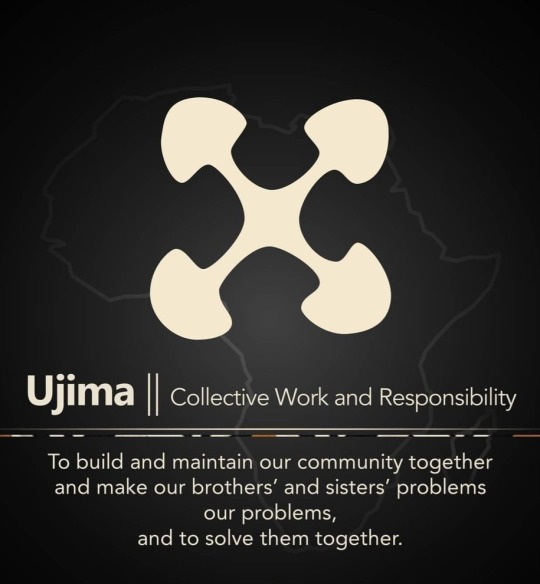
Ujima❤🖤💚
We devote the third day of Kwanzaa to Ujima – the principle of collective work and responsibility.
Ujima (oo-JEE-mah) Collective Work & Responsibility. "To build and maintain our community together and to make our Brother's and sister's problems, our problems and to solve them together." Nguzo Saba Kwanzaa Principle #3.
10 notes
·
View notes
Photo

The segcond day of Kwanzaa honors self-determination (kujichagulia) and is celebrated on December 27. The second Principle of the Nguzo Saba, as well as all seven principles, expresses itself as both commitment and practice.#kwanzaa#kwanza#happykwanzaa https://www.instagram.com/p/Cmq2xhkriUL/?igshid=NGJjMDIxMWI=
3 notes
·
View notes
Photo

December 26 marks the first day of Kwanzaa — today we’re reflecting on the unity of our allies, partners and volunteers in the fight for voting rights.
For those who might not know: Kwanzaa is a seven-day festival, founded in 1966 by Dr. Maulana Karenga as a pushback on the commercialism of Christmas and a way for Black Americans to celebrate the holiday through community building practices shared across the continent of Africa. The week is grounded is five central sets of values: ingathering, reverence, commemoration, recommitment and celebration.
Each day of #Kwanzaa is a celebration of a unique principle (the Nguzo Saba). The celebration always begins on 12/26 with Umoja (oo-MOH-ja) — unity.
4 notes
·
View notes
Photo

Maulana Ndabezitha Karenga, previously known as Ron Karenga, (born Ronald McKinley Everett, July 14, 1941) is an African-American professor of Africana studies, activist, and author, known as the creator of the pan-African and the African-American holiday of Kwanzaa. He was active in the Black Power movement and co-founded with Hakim Jamal the black nationalist group US Organization. He matriculated at UCLA and earned BA and MA in Political Science. He studied Swahili, Arabic, and other African-related subjects. Among his influences at UCLA were Jamaican anthropologist and Negritudist Councill Taylor who contested the Eurocentric view of alien cultures as primitive. He took the name Karenga (Swahili for "keeper of tradition") and the title Maulana (Swahili-Arabic for "master teacher"). He created Kwanzaa in 1966 to be the first pan-African holiday. He said his goal was to "give Blacks an alternative to the existing holiday and allow Blacks to celebrate themselves and their history, rather than simply imitate the practice of the dominant society." Kwanzaa is inspired by African "first fruit" traditions, and the name chosen is from Swahili, "matunda ya kwanza." The rituals of the holiday promote African traditions and Nguzo Saba, the "seven principles of African Heritage" that he described as "a communitarian African philosophy": #africanhistory365 #africanexcellence https://www.instagram.com/p/Cf_Z4k4LBdwCCSEf299Z053YXx7A3L2s9IpREk0/?igshid=NGJjMDIxMWI=
8 notes
·
View notes
Text
On this the seventh day of Kwanzaa, we lift up the principle of Imani (faith). This principle focuses on honoring the best of our traditions, draws upon the best in ourselves, and helps us strive for a higher level of life for humankind. Imani affirms our self-worth and confidence in our ability to succeed and triumph in righteous struggle. Imani is to believe in our people, our parents, our teachers, our leaders, and the righteousness and victory of our struggle.
This principle of the Nguzo Saba (seven principles) is a profound belief in and devotion to all that is of value to African people living in America as a family, community, people, and culture. The ancient Egyptian double symbol of the ankh (picture), represents life, and also djed, the symbol of stability, endurance, and power.
2 notes
·
View notes
Text
The Nguzo Saba, The Seven Principles of Kwanzaa:
Umoja (Unity): Encourages togetherness in family and community, highlighting the shared struggles and accomplishments of Black Americans.
Kujichagulia (Self-Determination): Emphasizes defining, naming, and speaking for oneself.
Ujima (Collective Work and Responsibility): Focuses on building community and solving problems together.
Ujamaa (Cooperative Economics): Encourages supporting and growing Black-owned businesses.
Nia (Purpose): Urges contributing to community building and development.
Kuumba (Creativity): Inspires using creativity to enhance the community.
Imani (Faith): Highlights faith in the community, struggle, and victory.
Each principle plays a vital role in strengthening community ties and fostering a sense of cultural pride and unity.
12 notes
·
View notes
Text
Habari Gani!
Here to elevate and celebrate Kwanzaa and the 7Principles, the Nguzo Saba!

#KwanzaaChat#kwanzaa#7Principles#NguzoSaba#Umoja#Kujichagulia#Ujima#Ujamaa#Kuumba#Nia#Imani#Harambee#blackjoy#wecelebratekwanzaa
5 notes
·
View notes
Text
Kwanzaa: Culture and the Practice of Freedom
Kwanzaa: Culture and the Practice of Freedom
#HabariGani #HappyKwanzaa #HerizaKwanzaa
“Kwanzaa, Culture and the Practice of Freedom: A Message and Model For Our Times“
Today, December 26 through January 1, 2023, is the celebration of Kwanzaa. This commemoration of community, culture, and family for African Americans, Africans, and those of African descent is based on the ideals of the first-fruit harvest.
The Seven Principles (Nguzo Saba) of Kwanzaa include:
Umoja (oo-MOE-jah) –…

View On WordPress
#African-American Celebration#Cleansing#Family#Fasting#First Fruits of Kiswahili#Kwanzaa#Poetry#Seven Principles
1 note
·
View note